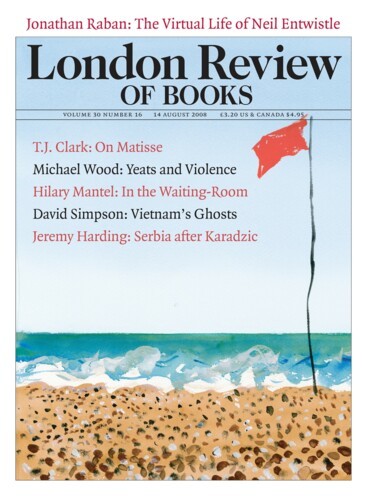Now that Radovan Karadzic has finally been arrested it is time to recall that Karadzic, a psychiatrist by profession, was not only a ruthless political and military leader, but a poet. His poetry should not be dismissed as ridiculous: it deserves a close reading, since it tells us something about the way ethnic cleansing works. Here are the first lines of an untitled poem, identified by its dedication, ‘For Izlet Sarajlic’:
Convert to my new faith crowd
I offer you what no one has had before
I offer you inclemency and wine
The one who won’t have bread will be fed by the light of my sun
People nothing is forbidden in my faith
There is loving and drinking
And looking at the Sun for as long as you want
And this godhead forbids you nothing
Oh obey my call brethren people crowd
A leader who offers his subjects ‘inclemency and wine’ stands for the obscene call of the superego: all prohibitions should be suspended so that the subject might enjoy a destructive orgy without end. The superego is the ‘godhead’ which forbids the people nothing. Such a suspension of moral prohibitions is a crucial feature of ‘postmodern’ nationalism. It turns on its head the cliché according to which passionate ethnic identification restores a firm set of values and beliefs amid the insecurity of global secular society, and serves instead as the facilitator of a barely concealed ‘You may!’ It is today’s apparently hedonistic and permissive society that is, paradoxically, more and more saturated by rules and regulations (restrictions on smoking and drinking, rules against sexual harassment etc), so that the notion of a passionate ethnic identification, far from demanding further restraint, functions instead as a liberating call: ‘You may! You may violate the stern regulations of peaceful co-existence in a tolerant liberal society! You may drink and eat whatever you want! You may flout political correctness; you may even hate, fight, kill and rape.’
Aleksandar Tijanic, a leading Serb columnist who was briefly Milosevic’s minister for information, has described the ‘strange kind of symbiosis between Milosevic and the Serbs’:
Milosevic generally suits the Serbs. Under his rule, Serbs abolished working hours. No one did anything. He allowed the black market and smuggling to flourish . . . Furthermore, Milosevic gave us the right to carry weapons, and to solve all our problems with weapons . . . Milosevic changed daily life into one long holiday and made us all feel like high-school pupils on a graduation trip – which means that nothing, but really nothing, of what you do is punishable.
Isn’t this the situation depicted in Emir Kusturica’s Underground (1995)? The film’s primary significance isn’t to do with the way it takes sides in the post-Yugoslav conflict (heroic Serbs versus treacherous, pro-Nazi Slovenes and Croats), but in its ‘depoliticised’ aestheticist attitude. When, in an interview for Cahiers du cinéma, Kusturica insisted that Underground is not a political film at all but a trance-like subjective experience, a ‘deferred suicide’, he was exposing the way in which it stages the ‘apolitical’ phantasmic background to post-Yugoslav ethnic cleansing and war crimes. By depicting the domain of ‘deferred suicide’ as an unending orgy of drinking, singing and copulating, which takes place outside time and outside the public arena, Kusturica effectively renders the libidinal economy of the ethnic slaughter perpetrated by the Serbs in Bosnia: the pseudo-Bataillean trance of excessive expenditure, the continuous mad rhythm of drinking-eating-singing-fucking.
And here resides the answer to the question ‘How were they able to do it?’ War has been defined as ‘a continuation of politics by other means’, but the fact that Karadzic is a poet enables us to see that ethnic cleansing in Bosnia was the continuation of (a kind of) poetry by other means. True, Milosevic ‘manipulated’ nationalist passions – but it was the poets who gave him the means to do this. They – the sincere poets, not the corrupted politicians – were at the origin of it all, when, back in the 1970s and early 1980s, they started to sow the seeds of aggressive nationalism, not only in Serbia, but also in the other ex-Yugoslav republics. Instead of the military-industrial complex, we in post-Yugoslavia had the military-poetic complex personified in the twin figures of Ratko Mladic and Radovan Karadzic.
Send Letters To:
The Editor
London Review of Books,
28 Little Russell Street
London, WC1A 2HN
letters@lrb.co.uk
Please include name, address, and a telephone number.

